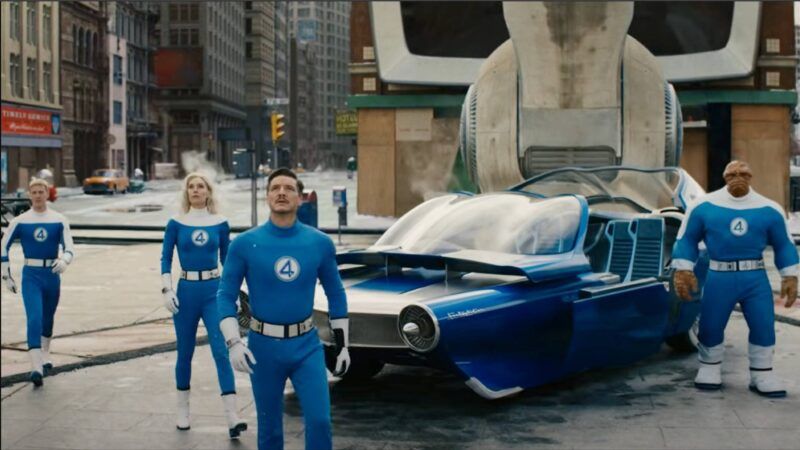The Fantastic Four: First Steps Positions Superheroes as Benevolent Techno-Authoritarians
A good enough take on Marvel's First Family that ignores its most interesting ideas.

The multiverse has not been kind to the Marvel Cinematic Universe (MCU). Since the pandemic, the nearly 20-year-old comic book megafranchise has been mired in alternate worlds and throwaway what-ifs that have muddled its simple superhero pleasures. For the last five years, the MCU has become an exercise in nerdy recall, a blockbuster franchise with all the sizzle of a convoluted Wikipedia article.
The latest entry, however, has finally found a good use for the multiverse. The Fantastic Four: First Steps is an alternate-universe Marvel movie that uses its parallel universe not to complicate but to separate, shedding the narrative labyrinths of its predecessors. Thanks to the multiverse, its heroic, blue-suited foursome simply exist in another world, one with little direct connection to the MCU as we know it.
This conceit frees the film from the baggage of MCU continuity, which keeps the film zippy and relatively focused. But it also sets up a secondary reality in which the Fantastic Four are not only superheroes but a sort of benevolent world government that rules through techno-superiority—a fascinating premise that it does almost nothing interesting with.
Technically The Fantastic Four: First Steps takes place on a strand of the multiverse known as Earth 828, but all you really need to understand is that it's a retro-futuristic alternate past in which sci-fi dreams have collided with mid-century modern design and a sort of techno-utopianism in which the planet's biggest problems—energy, war, transportation—have largely been solved.
In this world, the Fantastic Four are not just a superhero team but a quasi-governmental, multinational force known as the Future Foundation, a sort of family-run United Nations held together by the promise of the gee-whiz technology developed by the Four's leader and scientific visionary, Reed Richards (Pedro Pascal). This world is theirs to command, as nations and peoples have given up both war and nation-state autonomy in order to benefit from Richards' inventions.
It's a departure from the lighter, more soap-opera-like Fantastic Four comics I grew up reading in the late 1980s and early 1990s, though I gather some of these elements have been introduced to comic book readers in the decades since. But it allows for some potentially fascinating explorations of what it might actually mean for superheroes to exist in the world, for it positions the superhero team as the central figures in politics and global affairs.
I say potentially because the movie largely squanders that potential. Are the Fantastic Four actually techno-authoritarians? Are they good-hearted, benevolent rulers? Are there any trade-offs that might arise from such an arrangement? What happens if the people revolt against the Fantastic rule?
The movie occasionally hints at the complications that could occur, and one of its central conflicts does indeed involve the Four choosing to save one of their own rather than sacrifice something for the entirety of the planet. But as Sonny Bunch writes, for the most part, "the film doesn't wrestle with any of its ideas about techno-optimism and world's fair-style futurism, the promise and the peril of a post-conflict society." It's a movie that raises fascinating questions about the political nature of superpowers—and then effectively ignores them.
Which is a shame, given that those questions were much more front and center in this month's Superman relaunch. That film understood that superheroes are inherently political actors, especially when they use their powers to intervene in global conflicts and the affairs of nation-states. Superheroes would pose threats to governments, ideologies, and powerful actors of all kinds, even, and perhaps especially, if they were simply trying to do good.
Superman used this conflict to complicate its hero's quest to be a good and decent person. The Fantastic Four: First Steps simply brushes it aside in favor of more basic familial drama and comic book spectacle.
In that effort, it works reasonably well, building out the team's domestic dynamics while pitting them against their largest enemy, the planet-eating, god-like Galactus. The film is stylish, with strong design, photography, and special effects work. It might be the best-looking Marvel movie ever. And with a running time that clocks in at less than two hours, it's propulsive and well-paced, almost to the point of feeling hurried at times, as much of the film plays like an extended montage.
After multiple mediocre or outright awful Fantastic Four films, it's nice to finally see one that effectively captures the sci-fi soap opera sensibility of the comics. But it's also disappointing to see such a prosaic treatment of Marvel's First Family built on top of such an intriguing premise. This is a slick, stylish, and generally competent rendition of the Fantastic Four—but it could have been, well, fantastic.


Show Comments (20)